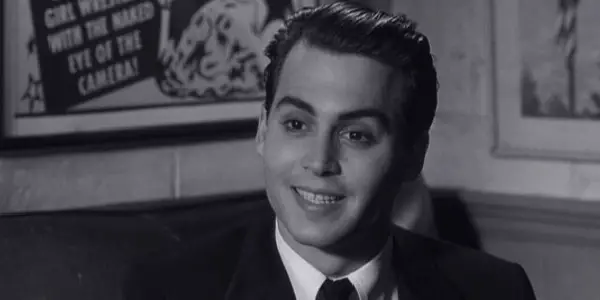Ed Wood, Tommy Wiseau & Losing Your Vision To The Public

I am an 18-year-old film enthusiast from North West England,…
The Disaster Artist highlights the mysterious and downright strange nature of Tommy Wiseau, the writer, producer, director and star of The Room – a feature that is considered to be one of the greatest worst films ever made. He is a man who stayed true to his bizarre vision for a “drama” and unintentionally created one of the funniest films of recent memory by making The Room so intriguingly puzzling. However, there was another filmmaker before Wiseau’s time that also lost his vision to the public, and his name was Ed Wood, the creator of such camp cult classics as Plan 9 from Outer Space.
There are numerous questions surrounding these two figures; how did they get these films made, how did they behave on set and, most importantly, how did they deal with public reactions that they were not anticipating?
Passionate, Dedicated And Flawed Filmmakers
The main point that links Wiseau and Wood is that neither of them were or are competent filmmakers. The Room has become a beloved treasure due to the terrible acting and poor dialogue, including hilarious lines like “You’re tearing me apart, Lisa!” and “Anyway, how is your sex life?” Wood’s films, such as Plan 9 from Outer Space, have that similar kind of charm, in that they make absolutely no sense and inadvertently became very comedic.

However, what makes both of these figures so endearing (or at least interesting) is the passion they both had or have for filmmaking. Neither of them wanted to strive away from their vision whatsoever. Both Wood and Wiseau thought that they were creating great pieces of work, and never really considered the prospect of being labelled as “so bad they’re good” filmmakers. This is really why films like The Room and Plan 9 from Outer Space became so popular, while other terrible films are heavily hated by critics and audiences; they are incompetent, but the passion behind them is evident in every single frame.
That’s not to say that Wiseau and Wood are identical characters; indeed, if we judge them both just from how they are portrayed in Ed Wood (directed by Tim Burton) and The Disaster Artist (directed by James Franco), it is clear that Ed Wood is the more likeable and sympathetic presence.
He loves life and has a sheer joy for what he does, as well as fully accepting who he is; he only films one take for each frame, as he believes that one shot is all he needs to achieve perfection, and he also completely embraces his transvestism, even turning up to the set dressed as a woman in the film. Wiseau, meanwhile, is depicted as a more unnerving, curious figure, one that is definitely less trustworthy and approachable than Wood.
Nevertheless, What Ed Wood and The Disaster Artist do so well is that they both avoid completely mocking these directors. The films acknowledge that a lot of their ideas are insane and weird, but you always feel a level of pity towards both of them for being so dedicated to their craft. This also almost paints a quite saddening portrait of both filmmakers, when you realise how much their passion projects have been laughed at and criticised over the years.
Ignoring The Fears Of The Cast And Crew
Since Wood and Wiseau did not really consider how the public would react to their work, they were very reluctant to take the advice of the people they were working with on board. At one point in Ed Wood, the titular character is having conflicts with others over the title of his film, as well as his casting choices and his directing style.
Shortly afterwards, he meets his idol, Orson Welles (as far as I am aware, this did not occur in real life), who inspires him to chase his dreams, even though Welles possesses all of the filmmaking talents that Wood does not. Despite Wood’s lack of ability, he refuses to let those around him alter his project, and the fact that he is also so open about his transvestism during this unaccepting period of time just shows how little he cares about their opinions of him.

Wiseau has a similar approach to filmmaking, although it is noticeable that he is a lot more mean-spirited towards his cast and crew. He struggles to remember lines, and the lines of dialogue he can remember are delivered very unconvincingly. During one scene in The Disaster Artist, the script supervisor, Sandy Schklair (played excellently by Seth Rogen), is totally baffled by the fact that, in character, Wiseau laughs at a story that is told about a woman being beaten up. He asks Wiseau to react to this story with more shock and horror but, typically, he ignores his demands and Schklair accepts defeat.
What also separates these two characters is the way they treat their cast and crew in general. If we judge Ed Wood just from Tim Burton’s portrayal of him alone, he is very respectful towards the people he works with, although he does get irritated when they try to sabotage his vision. His relationship with Bela Lugosi is particularly fascinating, and provides Wood with that extra level of human decency. Wiseau, on the other hand, can behave in a downright sociopathic manner sometimes; at one point in The Disaster Artist, he refuses to provide his cast and crew with a drink of water, causing one of the actresses to faint from dehydration.
The directors did everything in their power to avoid obstacles, and both succeeded in finishing and releasing their projects. Unfortunately, audiences did not seem to react in a way that either of them expected.
Accepting The Ridicule Of Their Passion Projects
Ed Wood did not seem to mind how audiences reacted to his work; he was proud of the fact that he even got to make the film in the first place, especially considering the lack of support he received from many of the people surrounding him. There’s one particular montage that showcases the filming of Plan 9 from Outer Space, in which Wood (played by Johnny Depp) looks like an ecstatic child during every single moment of the production. This is what makes the character so loveable; if he’s proud of his work, that’s all that matters. He cares about audience reactions so little that, straight after the premiere of Plan 9 from Outer Space, he elopes with his girlfriend named Kathy (played by Patricia Arquette) to Las Vegas to get married.
Despite Wood’s indifference, it is clear that audiences did not react to his films the way he intended; he believed that he was making a brilliant sci-fi epic, yet the inconsistencies and amateur filmmaking techniques caused sensations of amusement from viewers, turning Plan 9 from Outer Space into an unintentional comedy that would eventually develop a cult following.
Wiseau had a more difficult time accepting the ridicule that The Room received at its premiere. The viewing experience begins with a lot of awkward silence from the public, but this silence slowly begins to turn into laughter as the story progresses. After realising that the audience members are not taking his dramatic film seriously, Wiseau (James Franco) leaves the screening, hurt, upset and angry.

However, his best friend and co-star, Greg Sestero (Dave Franco) lifts his spirits by insisting that, although the reaction is not what he desired, it is still a beautiful thing that his friend’s project is bringing so much joy to others. When Wiseau accepts the fate of his film, he gives a speech at the end of the premiere, insisting that The Room was intended to be a comedy all along. The audience cheers, Wiseau looks immenesly proud and The Disaster Artist shortly draws to an end.
Wood and Wiseau would not let unexpected audience reactions affect how they feel about their own work; if people refuse to take their films seriously, the directors will happily join in on the joke.
Conclusion
Ed Wood and Tommy Wiseau may have arguably conjured up some of the worst films ever made, but their work has still endured and developed a dedicated fan base due to their clear adoration for filmmaking. Both set out to be the next Hitchock or Kubrick, and failed miserably. But it is their acceptance of people mocking their work that makes Wood and Wiseau admirable figures, although it is highly doubtful that we will ever discover what was going on in their minds when they created these absurd pictures.
What are your thoughts on Ed Wood and Tommy Wiseau?
Does content like this matter to you?
Become a Member and support film journalism. Unlock access to all of Film Inquiry`s great articles. Join a community of like-minded readers who are passionate about cinema - get access to our private members Network, give back to independent filmmakers, and more.
I am an 18-year-old film enthusiast from North West England, who loves writing about anything related to cinema. I particularly love psychological thrillers, comedies, dramas, science fiction movies and musicals, but I will happily watch films from any genre. Furthermore, I adore classic Hollywood cinema and would love to write about films from that era. I am always looking to improve my writing, and I hope that you enjoy reading my work!












